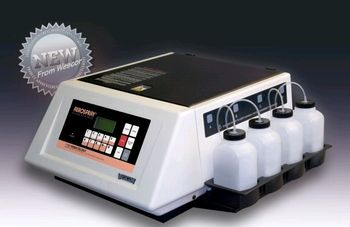Wescor - Aerospray 7150
by Wescor


Slide strainer
Wescor has developed a novel staining process for the methanolic Hematology stainer (U.S. Patent No. 6,058,432B2). Separate thiazin and eosin stains are blended in concentrated form, sprayed onto the specimen and partially evaporated by centrifugal airflow. This greatly accelerates staining and produces stains of superior quality. For dilute staining the blended stains are diluted with buffer. Wescor has become a world leader in staining technology during the past two decades. The company has steadily improved the groundbreaking Aerospray staining method with advancements in staining quality, user-convenience and cost reduction. Wescor continues to innovate and listen carefully to those in the Hematology community to improve Aerospray. The Model 7150 Aerospray is the result of this relentless search for excellence. Wescor has modified the traditional Romanowsky methanolic staining process with a unique mixing system that produces partially aqueous stains, while maintaining the advantage of separate storage of eosin and thiazin components. Aerospray employs centrifugal force to accelerate staining, and to dry the slides. Simultaneous contact by both dyes produces the classic Romanowsky staining patterns with superior, textbook quality results. The Thiazin and eosin dyes are loaded separately onto the instrument to correct the reagent stability problems common with mixed stains. These stains are automatically mixed prior to application to produce superior results. Aerospray offers a versatile selection of 9 different intensities for each of the 4 set programs: Rapid Wright- Giemsa, Wright-Giemsa, May-Grünwald Giemsa and Custom Stain with simple adjustment routines to tailor the staining to individual preference. A programmable function is also available for special staining requirements. Fixation can be done in the instrument, or slides can be hand-fixed. While methanol is the normal fixative, Aerofix may be required in humid environments. With the Aerospray you get up to 120 slides an hour and the convenience of cytocentrifugation in the same instrument.
0Replies5 years ago | Maintenance Procedure for PM Does anyone out there have the PM protocol for this asset?Reply |
0Replies6 years ago | Nozzle Aerospray 7150 started stripping the slides this week-end. when I came in this morning noticed that Nozzle D was not sitting correctly in its place. when I removed it, it seems there is a plastic with a whom that came out of position from this nozzle. Any suggestion on how to fix it.Reply |
0Replies9 years ago | needs Service? Reply |